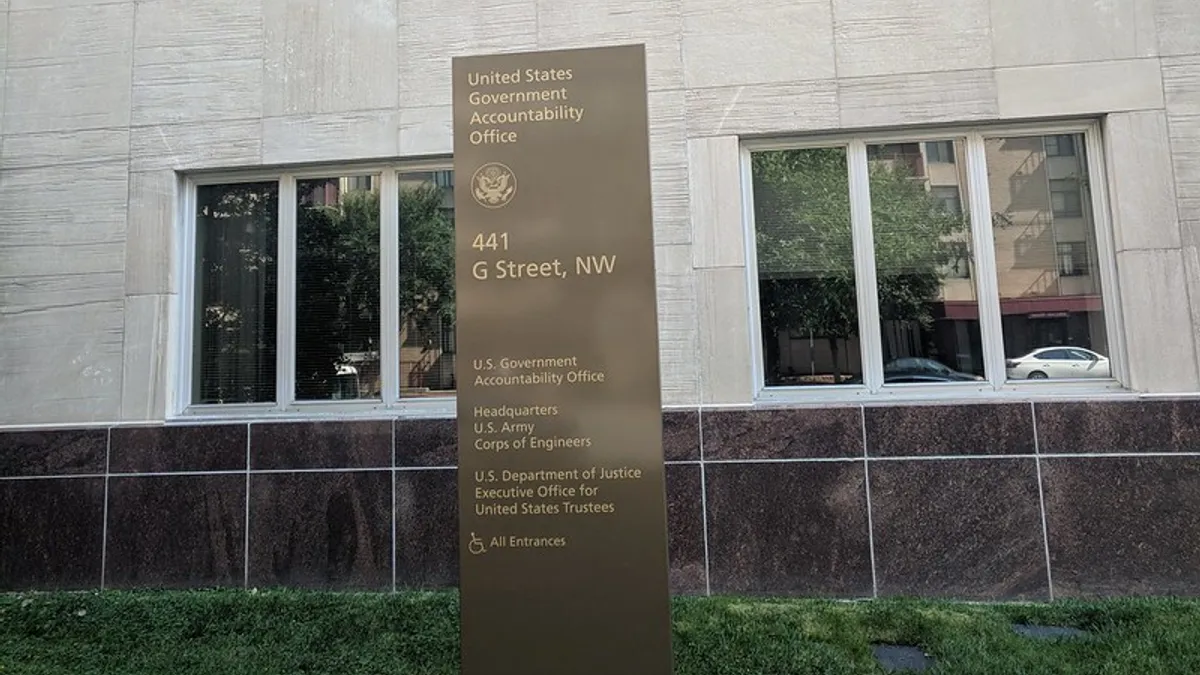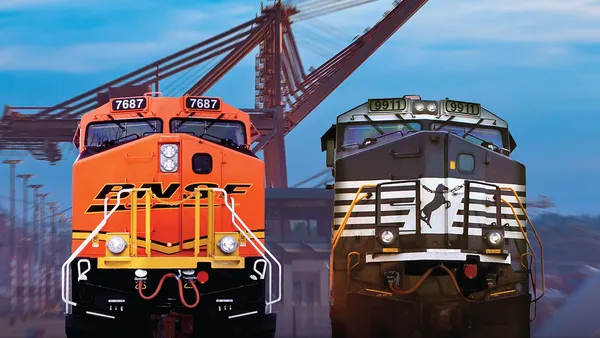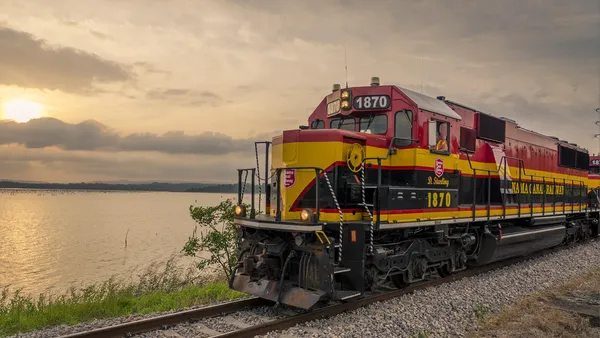UPDATE: Nov. 18, 2021: Work is officially underway on the study, Charles Young, managing director of public affairs at the GAO, said in an email. But it's too early to say when the work will be completed.
UPDATE: July 6, 2021: The GAO accepted Congress' request to conduct a study on the effects of PSR. "Work will likely begin in September," Charles Young, managing director of public affairs at the GAO, said in an email. "We won't have an estimated timeline for completion until after the work begins."
Dive Brief:
- A committee of the U.S. House of Representatives on Wednesday sent a letter asking the Government Accountability Office to conduct a study into the impact precision scheduled railroading has had on shippers and "other affected parties."
- The letter from the House Transportation and Infrastructure Committee asked the GAO to investigate whether there is a direct link between the PSR model and 10 practices or metrics tracked by railroads, such as changes in demurrage fees and reliability of service to freight shippers.
- It typically takes a "couple weeks" for the GAO to review such requests "before any decisions are made," Charles Young, managing director of public affairs at the GAO, said in an email.
Dive Insight:
It's not the first time precision scheduled railroading has come under scrutiny, but the timing of the letter requesting a study from the GAO suggests the results could be used to inform upcoming regulatory decisions, such as a proposed infrastructure package or the acquisition of Kansas City Southern.
"I am concerned that [the PSR] strategy could come at the expense of worker safety and smart, long-term railroad management," Democratic Rep. Donald M. Payne, Jr. of New Jersey said in a statement.
The PSR model has become widespread among U.S. railroads. CSX, Union Pacific, Norfolk Southern, and KCS have each adopted elements of the model.
Adopters of the model say they seek to improve service and reliability, reduce dwell time and increase train speed to compete with other modes of transport, such as trucking.
But since railroads began to adopt PSR principles, various shippers have shared their dissatisfaction with the results. In 2017, shippers testified to the Surface Transportation Board about frustrations related to CSX's shift to PSR. More recently in 2019, shippers went to a subcommittee of the U.S. House of Representatives to voice their concerns.
"Last Congress, my Committee heard from various stakeholders concerned for the immediate and long-term impacts of PSR," Rep. Peter DeFazio,D-Ore., who chairs the Committee on Transportation and Infrastructure, said in a statement. "This study ... will help us find ways to address the impacts this railroad management strategy has on workers, freight shippers, passenger railroads, and rail safety."
The letter, signed by DeFazio and Payne specifically requested the GAO provide a report that investigates and provides recommendations on how to address "any impacts of PSR on labor, freight shippers, passenger railroads or railroad safety."
The GAO has no direct oversight over railroad operations, but it reports to Congress and as such, often gets requests by representatives to conduct independent studies on issues relevant to regulation.
In particular, the letter outlined how several practices — such as the use of longer trains or the elimination of operational facilities — will affect railroads' ability to service shippers, or "respond to changes in demand."
Several shippers brought up concerns about the effect of PSR on service at the 2019 subcommittee hearing.
"For our sector, PSR has resulted in increasing arbitrary, abrupt and disruptive changes to operations plans and service schedules," Randy Gordon, president of the National Grain and Feed Association, said in 2019.
It's not a novel complaint. In 2017, the Surface Transportation Board heard similar issues from shippers.
"Our Pringles plant is also entirely dependent on CSX for inbound and outbound east of the Mississippi River," Sharon Moss-Higham, senior vice president of operations and distribution for Kellogg’s Snacks division, said in 2017. "Kellogg does not have the option to use a different rail carrier to mitigate the impact of any rail service disruptions."
Railroads have never shied away from acknowledging PSR would lead to some service interruptions, and apologizing for them. But despite its faults, most railroads say the model improves service.
"If I don't accomplish anything else today, I want to apologize to our valued shippers," said the late Hunter Harrison, then-CEO of CSX as it was transitioning to PSR. "Whatever problems we had, we had internally. We've made some mistakes. This is not a failure of precision scheduled railroading."
Next to him at the time was Cindy Sanborn, then-COO of CSX. Now, Sanborn is helping to lead the transition to PSR at Norfolk Southern, and telling investors a similar message.
"I think we all agree that moving a car faster is good for both asset utilization and our customers, so that is really kind of a happy medium with solving all of those issues," Sanborn said during Norfolk Southern's Q3 earnings call, in response to a question about providing a "service delivery index" to customers.
"We have quite a bit of focus in general on serving our customers well," said Sanborn, adding Norfolk Southern Chief Marketing Officer Alan Shaw and Sanborn frequently discuss the topic.















